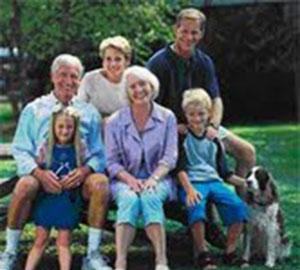Experts at the University of Exeter Medical School, supported by the National Institute for Health Research Collaboration for Leadership in Applied Health Research and Care in the South West Peninsula (NIHR PenCLAHRC), led an international collaboration which discovered that people who had a long-lived mother or father were 24% less likely to get cancer. The scientists compared the children of long-lived parents to children whose parents survived to average ages for their generation.
The scientists classified long-lived mothers as those who survived past 91 years old, and compared them to those who reached average age spans of 77 to 91. Long-lived fathers lived past 87 years old, compared with the average of 65 to 87 years. The scientists studied 938 new cases of cancer that developed during the 18 year follow-up period.
Professor William Henley, from the University of Exeter Medical School, said: “Previous studies have shown that the children of centenarians tend to live longer with less heart disease, but this is the first robust evidence that the children of longer-lived parents are also less likely to get cancer. We also found that they are less prone to diabetes or suffering a stroke. These protective effects are passed on from parents who live beyond 65 — far younger than shown in previous studies, which have looked at those over the age of 80. Obviously children of older parents are not immune to contracting cancer or any other diseases of ageing, but our evidence shows that rates are lower. We also found that this inherited resistance to age-related diseases gets stronger the older their parents lived.”
Ambarish Dutta, who worked on the project at the University of Exeter Medical School and is now at the Asian Institute of Public Health at the Ravenshaw University in India, said: “Interestingly from a nature versus nurture perspective, we found no evidence that these health advantages are passed on from parents-in-law. Despite being likely to share the same environment and lifestyle in their married lives, spouses had no health benefit from their parents-in-law reaching a ripe old age. If the findings resulted from cultural or lifestyle factors, you might expect these effects to extend to husbands and wives in at least some cases, but there was no impact whatsoever.”
In analysing the data, the team made adjustments for sex, race, smoking, wealth, education, body mass index, and childhood socioeconomic status. They also excluded results from those whose parents died prematurely (ie mothers who died younger than 61 or fathers younger than 46).
Source: sciencedaily
B.N

